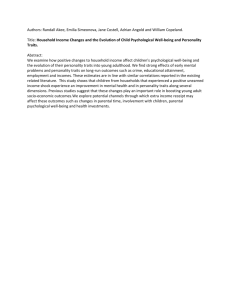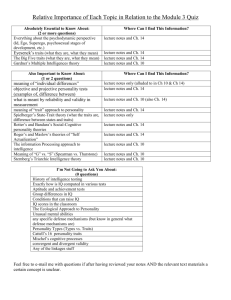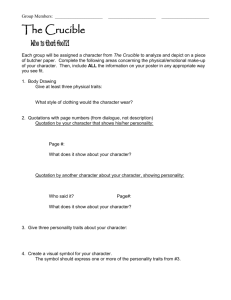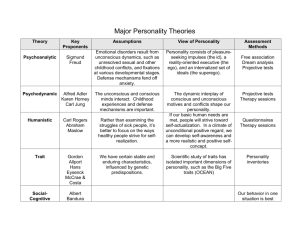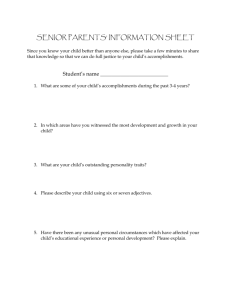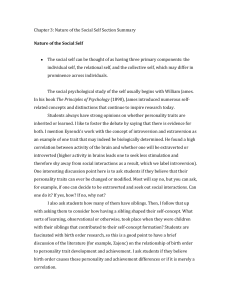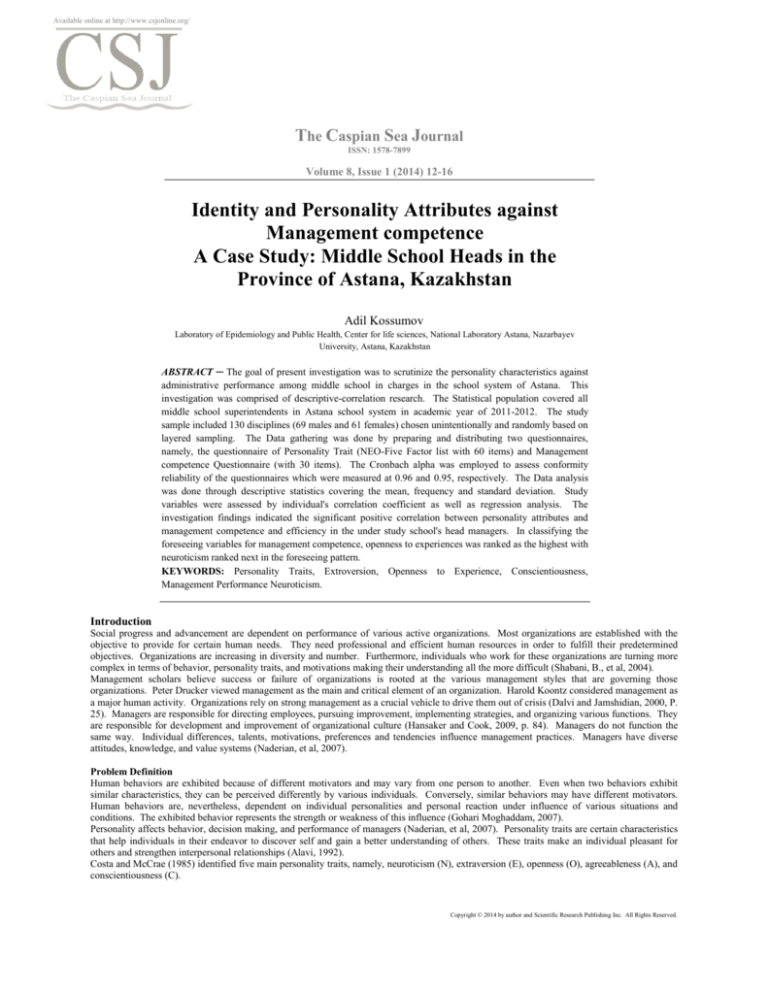
Available online at http://www.csjonline.org/
The Caspian Sea Journal
ISSN: 1578-7899
Volume 8, Issue 1 (2014) 12-16
Identity and Personality Attributes against
Management competence
A Case Study: Middle School Heads in the
Province of Astana, Kazakhstan
Adil Kossumov
Laboratory of Epidemiology and Public Health, Center for life sciences, National Laboratory Astana, Nazarbayev
University, Astana, Kazakhstan
ABSTRACT ─ The goal of present investigation was to scrutinize the personality characteristics against
administrative performance among middle school in charges in the school system of Astana. This
investigation was comprised of descriptive-correlation research. The Statistical population covered all
middle school superintendents in Astana school system in academic year of 2011-2012. The study
sample included 130 disciplines (69 males and 61 females) chosen unintentionally and randomly based on
layered sampling. The Data gathering was done by preparing and distributing two questionnaires,
namely, the questionnaire of Personality Trait (NEO-Five Factor list with 60 items) and Management
competence Questionnaire (with 30 items). The Cronbach alpha was employed to assess conformity
reliability of the questionnaires which were measured at 0.96 and 0.95, respectively. The Data analysis
was done through descriptive statistics covering the mean, frequency and standard deviation. Study
variables were assessed by individual's correlation coefficient as well as regression analysis. The
investigation findings indicated the significant positive correlation between personality attributes and
management competence and efficiency in the under study school's head managers. In classifying the
foreseeing variables for management competence, openness to experiences was ranked as the highest with
neuroticism ranked next in the foreseeing pattern.
KEYWORDS: Personality Traits, Extroversion, Openness to Experience, Conscientiousness,
Management Performance Neuroticism.
Introduction
Social progress and advancement are dependent on performance of various active organizations. Most organizations are established with the
objective to provide for certain human needs. They need professional and efficient human resources in order to fulfill their predetermined
objectives. Organizations are increasing in diversity and number. Furthermore, individuals who work for these organizations are turning more
complex in terms of behavior, personality traits, and motivations making their understanding all the more difficult (Shabani, B., et al, 2004).
Management scholars believe success or failure of organizations is rooted at the various management styles that are governing those
organizations. Peter Drucker viewed management as the main and critical element of an organization. Harold Koontz considered management as
a major human activity. Organizations rely on strong management as a crucial vehicle to drive them out of crisis (Dalvi and Jamshidian, 2000, P.
25). Managers are responsible for directing employees, pursuing improvement, implementing strategies, and organizing various functions. They
are responsible for development and improvement of organizational culture (Hansaker and Cook, 2009, p. 84). Managers do not function the
same way. Individual differences, talents, motivations, preferences and tendencies influence management practices. Managers have diverse
attitudes, knowledge, and value systems (Naderian, et al, 2007).
Problem Definition
Human behaviors are exhibited because of different motivators and may vary from one person to another. Even when two behaviors exhibit
similar characteristics, they can be perceived differently by various individuals. Conversely, similar behaviors may have different motivators.
Human behaviors are, nevertheless, dependent on individual personalities and personal reaction under influence of various situations and
conditions. The exhibited behavior represents the strength or weakness of this influence (Gohari Moghaddam, 2007).
Personality affects behavior, decision making, and performance of managers (Naderian, et al, 2007). Personality traits are certain characteristics
that help individuals in their endeavor to discover self and gain a better understanding of others. These traits make an individual pleasant for
others and strengthen interpersonal relationships (Alavi, 1992).
Costa and McCrae (1985) identified five main personality traits, namely, neuroticism (N), extraversion (E), openness (O), agreeableness (A), and
conscientiousness (C).
Copyright © 2014 by author and Scientific Research Publishing Inc. All Rights Reserved.
Identity and Personality Attributes against Management competence
1.
2.
3.
4.
5.
Neuroticism is the general tendency toward negative emotional experiences such as fear, sadness, anxiety, anger, guilt, and aversion.
Neuroticism is more than being receptive to psychological predicaments. Males and females who score high in neuroticism are prone to
have irrational beliefs, uncontrollable impulses, and poor reactions to stressful stimuli (Garoosi Farshi, 2001).
Extraverts are sociable individuals. They love people and prefer group activities. They are daring, active, and talkative. Extraverts
welcome arousal and excitation. They tend to be joyful, energetic, and optimistic (Costa and McCrae, 1985).
Openness is a less known personality dimension. Fantasy, aesthetics, feelings, actions (experiences), ideas (curiosity), values (judgments)
are openness elements. These traits are mentioned in personality theories and evaluations. However, their collection into a wide spectrum
and formation as a personality trait were rarely subject of discussion (Costa and McCrae 1985).
Agreeableness is another form of interpersonal tendency similar to extroversion. Agreeable individuals are compassionate and
cooperative. They view others as having similar properties.
Conscientious individuals are objective oriented, decisive, and determined. Successful individuals, great musicians, and famous athletes
show high levels of conscientiousness (Costa, McCrae, and Bush, 1986, as quoted in Garoosi Farshi, 2001).
Research Literature
Management includes a set of activities that are organized in the direction of achieving defined objectives. Management is the task of
establishing relations between available resources and organizational performance through active decision making and participation of others.
The principal objective of management in an organization is to coordinate various resources toward achievement of organizational objectives.
For example, objectives of educational institutions are advancement of education and learning (Alagheband, 1995, p. 15).
Management tasks have historically been involved in planning. Organizing, directing and coordinating tasks require planning because they
materialize over time (Gilbreth, Taylor, and Gantt, 1990, p. 46). Management scholars have defined management as a collection of
responsibilities that every manager should undertake. Some of them emphasized on specific responsibilities and some others have only
mentioned general responsibilities for managers. Gulick and Urwick were the first ones to list management responsibilities and dubbed them
POSDCORB. Their list included planning, organizing, staffing, directing, coordinating, reporting, and budgeting. Most management experts
agree on four responsibilities, namely, planning (decision making), organizing, directing (leadership), and control. A manager performs these
tasks in an endeavor to achieve organizational objectives. Actual performance of these functions represents the effectiveness of organization and
management.
This study examines five management responsibilities, namely, planning, organizing, coordinating, staffing, and evaluating.
1. Planning. Planning involves selection of the most suitable approach among various alternatives for achieving organizational objectives.
Planning process defines organizational objectives, sets departmental goals, and selects the proper approaches for achieving those
objectives and goals. Planning is central to management activities and involves other management responsibilities (Alvani, 1999, p. 138).
2. Organizing: Organizing is defined as identification and classification of the required tasks, grouping of necessary activities into achievable
goals, assignment of each group to a manager, delegation of authority for supervision, plus vertical and horizontal coordination of activities
within an organization (ibid).
3. Coordinating: Coordinating means unifying departmental activities within an organization toward effective realization of defined
objectives and goals. Departmental activities may swerve from organizational objectives if the required arrangements and provisions are
not planned and projected (Alagheband, 1995, p. 54).
4. Staffing. Staffing represents the overall human relations in an organization. Proper staffing helps organizations to boost employee morale
which is a collection of feelings, emotions, and thoughts. Employee morale translates into job satisfaction which is a collection of spiritual
and material satisfaction employees draw from their organizational activities (Safi, 2000, p. 75).
5. Evaluating: Evaluating is required to measure the effectiveness and quality of performance. Evaluation process help managers to
determine how much of objectives have been realized. Quality control also requires evaluation. Evaluation knowledge and experience
should be one prerequisite for individuals who are being appointed to managerial posts (Acheson and Gall, 1999, p. 59).
Managing these five functions requires leadership. Leadership is the art of directing and energizing others in voluntarily pursuing and
committing to leader's views (Cutler, 1990, p. 14). Leaders determine objectives and perspectives, then, organize members to voluntarily commit
to those objectives and perspectives (Cheng and Filzah, 2011, p. 908).
Leadership in education has special standing because of diverse activities, various implementations, and complicated objectives. Today's
complicated educational system requires attention to personality characteristics when selecting educational managers.
The objective of this study was to examine the relations between personality traits of educational managers and their performance in order to
determine which personality traits may be good predictors of educational managers' effectiveness in performing their responsibilities.
Research Background
Kaykhanejad (2008) studied the relationship between philosophical intellect and performance of responsibilities in middle school managers of
Zahedan school system. She found a significant direct relation between the two variables. The direct relationship means the higher philosophical
intellect the higher performance of managerial responsibilities.
Naderian Jahromi and Amir Hossieni (2007) examined the relationship of job skills versus personality traits and demographic information of
sports managers. They reported significant relation between introversion personality traits and perceptional and technical skills. Extroversion
personality traits had significant relation with human skills. Demographic variables such as age, gender, marriage status, management
experience, and sports background did not have significant relation with human skills. Education and management experience had significant
relation with perceptional skills. Sports experience and field of study had significant relation with technical skills.
Khakpour (2004) in his thesis studied the association between personality traits and job performance in superintendents of Hamedan intermediate
schools during academic year 2003-2004. The findings of this study revealed that job performance had significant relations with extroversion,
emotional stability, and agreeableness personality traits. Job performance had no significant relations with age or job experience. Khakpour
study found no significant difference in job performance of female and male superintendents.
Bazr Afshan Moghaddam (1996) studied the relations between personality traits and performance in elementary school superintendents. The
findings showed no significant relation between effective and non-effective superintendents and their personality traits. Byrne, et al (2005)
examined the relationship between personality traits and job performance. They reported that conscientiousness as a good predictor of job
performance (as quoted in Na'ami, 2005). Kurk et al (2003) analyzed the relationship between five personality traits and job performance. They
found that conscientiousness had the highest correlation with job performance.
Friedson (1999) concluded in a study that introverts reacted better to tensions. This characteristic helps an introvert individual to perceive and
assess problems and difficulties as controllable. Introverts resort more to problem solving approaches and less to emotional strategies when
13
The Caspian Sea, Volume 8, Issue 1 (2014)
www.csjonline.org
facing stressful situations when compared to extroverts. Yuonne (1993) studied 87 male and female managers to discover that gender is only
effective in decision making but not in job or professional performance. Lewin (1965) concluded in a study that extrovert managers are mostly
sociable. They are more effective in establishing successful relations with colleagues, subordinates, and customers. They live in complete
conformance to requirements of their surrounding environment.
Research Objectives
The objective of this study was to identify the relationship between personality traits and management performance in middle school
superintendents working for Astana school system.
Research Questions
1- is there a significant relation between personality traits and management performance?
2- Are personality traits good predictors of management performance?
Research Methodology
This study used descriptive-correlation method as determined by its subject and objectives. Statistical population included all middle school
superintendents in Astana school system totaling 189 persons. The size of study sample was determined to be 130 by Morgan table. Study
subjects were selected randomly using stratified sampling.
This study used NEO-FFI for examining personality traits. This questionnaire had 60 items divided into five areas (neuroticism, extroversion,
openness to experience, agreeableness, and Conscientiousness), each having 12 items. This study used a researcher-made questionnaire adapted
from the one used by Kaykhanejad (2008) for examining management performance. This questionnaire had 30 itams divided into five areas
(planning, organizing, coordinating, staffing, and evaluation) each having 6 items. Cronbach alpha was used to evaluate consistency reliability of
the questionnaires which were measured at 0.96 and 0.95 respectively.
This study used both descriptive and inferential methods for data analysis. Descriptive method used statistical measures such as frequency, mean,
and standard deviation to describe available data. Inferential method used statistical tests including Pearson correlation coefficient, regression
analysis, and one-way analysis of variance to evaluate study questions.
Research Findings
Question 1: Is there a significant relation between personality traits and management performance?
Table 1 provides descriptive statistics including mean and standard deviation for personality traits and management performance obtained from
the study sample.
Table 1Descriptive Statistics
Personality Traits versus Management Responsibilities
Mean
Standard
Deviation
Neuroticism
49.08
4.89
Extroversion - Introversion
40.75
4.61
Openness to New Experiences
49.80
3.87
Agreeableness
49.73
5.14
Conscientiousness
49.31
4.62
Planning
26.29
3.33
Organizing
23.96
2.43
Coordinating
23.80
3.44
Staffing
25.51
3.12
Evaluating
23.80
3.81
Variables
Personality
Traits
Management Responsibilities
Pearson correlation coefficient was used to examine question one. Table 2 shows the results of inferential statistics.
14
Identity and Personality Attributes against Management competence
Table 2 Pearson Correlation Coefficient
Personality Traits versus Management Responsibilities
Management Responsibilities
Personality Traits
Planning
Organizing
Neuroticism
0.648
0.509
Extroversion - Introversion
0.583
Openness to New Experiences
Coordinating
Staffing
Evaluating
0.611
0.489
0.552
0.341
0.622
0.466
0.379
0.707
0.529
0.704
0.580
0.582
Agreeableness
0.534
0.415
0.535
0.516
0.503
Conscientiousness
0.611
0.441
0.613
0.476
0.536
p = 0.000
Table two indicates that the relations between personality trait and management responsibilities are significant at 99 percent level of confidence
(p < 0.01). Therefore, we conclude that personality traits have significant direct relation with management performance.
Question 2: Are personality traits good predictors of management performance?
This study used step-by-step regression analysis for analysis of personality traits versus management performance. Table 3 shows the results of
this analysis.
Table 3 Regression Analysis
Personality Traits versus Management Responsibilities
Step
Variable
R
R2
F
β
t
Sig
1
Openness to New Experiences
0.70
0.49
127.20
0.70
11.27
0.000
2
Openness to New Experiences
+ Neuroticism
0.75
0.57
85.56
16.74
0.50
0.34
7.03
4.74
0.000
N = 130
p < 0.01
In ranking the predictable variables for management performance, openness to new experiences could predict 49 percent of management
performance variance. In the next step, neuroticism was added to the predictive model. These two variables together could predict 57 percent of
management performance variance. This means that neuroticism can only add 8 percent to prediction variance. Standard beta coefficient in
regression model is 0.50 for openness to new experiences and 0.34 for neuroticism. Both of them are significant at 99 percent level of confidence
(p > 0.01).
Discussion and Conclusion
Management is a critical function of an organization. Organizations rely on strong management as a crucial vehicle to drive them out of the crisis
they may face. The examination of the first research question showed significant relation between personality traits and management
performance. The relationship is significant at 99 percent level of confidence (p > 0.01). Therefore, we can conclude that personality traits have
significant direct relation with management performance. This conclusion conforms to the results reported by similar studies (Kalantari, 2007;
Naderian Jahromi and Amir Hosseini, 2007; Khakpour, 2004; Bazafshan Moghaddam, 1996; Byrne, et al, 2005; and Kurk, et al., 2003).The
examination of the second research question and the ranking of predicting variables of management performance indicated that openness to new
experiences could predict 49 percent of variance. In the next step, neuroticism was added to the predictive model. These two variables together
could predict 57 percent of management performance variance. This means that neuroticism can only add 8 percent to prediction variance.
Standard beta coefficient in regression model was measured 0.50 for openness to new experiences and 0.34 for neuroticism. Both of them are
significant at 99 percent level of confidence (p > 0.01). This conclusion conforms to the results reported by similar studies (Kalantari, 2007;
Naderian Jahromi and Amir Hosseini, 1999; Khakpour, 2004; Bazafshan Moghaddam, 1996; Byrne, et al, 2005; and Kurk, et al., 2003).
Therefore, it is possible to conclude that personality traits affect management performance. Those managers who enjoy positive personality traits
are most likely to be more successful managers. They can make higher contribution to achievement of educational objectives and plans. They
are able to establish better relation with school employees, teachers, students, parents, and other stakeholders. Openness to new experiences and
neuroticism could predict a relatively higher percentage of management performance among personality traits under study. This confirms the
effect of personality traits on management performance.The findings of this study show that organizations, in general, and educational
institutions, in particular, should consider personality trait of the candidates for managerial positions before making their final selection. This
approach can guarantee better performance for our school system. Organizations should ask psychologists and specialists to administer
personality tests on employees in order to identify those who may qualify for managerial positions. After identifying candidates, organizations
should invest on their further training to prepare them for the managerial positions they are most qualified for.
15
The Caspian Sea, Volume 8, Issue 1 (2014)
www.csjonline.org
References
1. Acheson, K. and Gall, D. M., (1999), Educational and Institutional Management: Application of Management Theories in Planning, (M. R. Behrangi, Trans.),
Tehran: Kamal Tarbiat Publishing.
2. Alagheband, A. (1995), Introduction to Educational Management, Tehran: Be'that Publishing.
3. Alavi, A., (1992), Organization and Management Psychology, 1st Edition, Tehran: Public Management Training Center.
4. Alvani, S. M. (1999), Decision Making and Strategic Planning, Tehran: Samt Publishing.
5. Bazrafshan Moghaddam, S. M., (1996), Study of The Relation between Personality and Management Effectiveness, Master's Thesis in Psychology, Tarbiat
Moallem University of Tehran (Tehran Teachers Training University).
6. Cheng, wei hin. &filzah md . isa (2011) Leadership Styles, Management Styles and Personality Traits of Successful Women Entrepreneurs in Malaysia: Annual
Summit on Business and Entrepreneurial Studies
7. Costa, P. T. and McCrae, R. R. (1992) NEO- PI(R): Professional Manual Odessa, F1: Psychological Assessment Resources.
8. Dalvi, M. R.; Jamshidian, M.; and Pour Hakim, R. (2000), Introduction to Organization and Management: Concepts, Principles, Processes, Theories, and
Applications), Isfahan: Simin Publishing.
9. Fayol, H., Taylor, F. and Gilbreth, L. (1990) The Role of Managers, 3rd Edition, New York: Harper and Row
10. Friedson, E. (1999) Professions and the Occupational Principle: Friedson (ED) Profession and Their Prospects ( pp 19-27). Beverly Hills (A: sage)
11. Garoosi Farshi, M. T., (2001), A New Approach in Personality Evaluation, Tabriz: Jame'eh Pajooh Publishing.
12. Gohari Moghaddam, M., (2007), The Relation between Personality Traits and Leadership Style in Superintendence of Intermediate Boys and Girls Schools,
Masters' Thesis, Azad University, Tonekabon Campus.
13. Hunsaker, P. and Cook, C. W. (2009) Management and Organizational Behavior, 3rd Edition, New York: McGraw-Hill
14. Kark, R., Shamir, B., Chen, G. (2003) The Two Faces of Transformational Leadership: Empowerment and Dependency. Journal of Applied Psychology, 88(2),
pp 255-296.
15. Khakpour, A. (2004), Study of the Relation between Personality Traits and Job Performance of Hamedan Intermediate Schools Superintendence in Academic
Year 2003-2004, Master's Thesis, Shahid Beheshti University, Tehran.
16. Khaykhanejad, M., (2008), Study of the Relation between Philosophical Mentality and Its Dimensions versus Management Performance in Intermediate Schools
Superintendence in Zahedan, Masters' Thesis, Sistan and Baluchistan University.
17. Kotter, J. P. (1990) What Leaders Really Do, Harvard Business Review, 68, May- June Issue.
18. Lewin, K. (1965) A Dynamic Theory of Personality, New York: McGraw-Hill.
19. McCrae, R. R. and Costa, P. T. Jr. (1985). Updating Norman's Adequate Taxonomy: Intelligent and Personality Dimensions in Natural Language and
Questionnaires, Journal of Personality and Social Psychology, 24, pp. 107-127.
20. McCrae, R. R. and Costa, P. T. Jr. (1977) Validation of the Five-Factor Model of Personality across Instruments and Observers, Journal of Personality and Social
Psychology, 52:81
21. Na'ami, A. Z. (2005), Study of Leadership Styles and Job Satisfaction in Employees of Khuzestan Steel Mill, PhD. Thesis in Psychology, Shahid Chamran
University, Ahwaz.
22. Naderian Jahromi, M. and Amir Husseini, S. E., (2007), Study of the Relation between Personality Traits and Demographic Information of Sports Managers
versus Their Job Skills, Olympic Quarterly, 15 (3)
23. Safi, A. (2000), Educational Organization and Management, Tehran: Arasbaran Publishing.
24. Shabani Bahar, Gh., Amir Tash, A. M., Moshref Javadi, B., and Tondnevis, F. (2004), Study of the Relation between Personality Traits and Sports Managers'
Effectiveness in Kazakhstan Universities, Sports Education Journal and Sports Science and Exercise Journal , Spring Issue, No. 3, pp. 12-30.
25. Yuonne, M. (1993) Sex Role Orientation: Coping Strategies and Perspective for Woman Administrator, Educational Management and Administration, 21(2)
16


